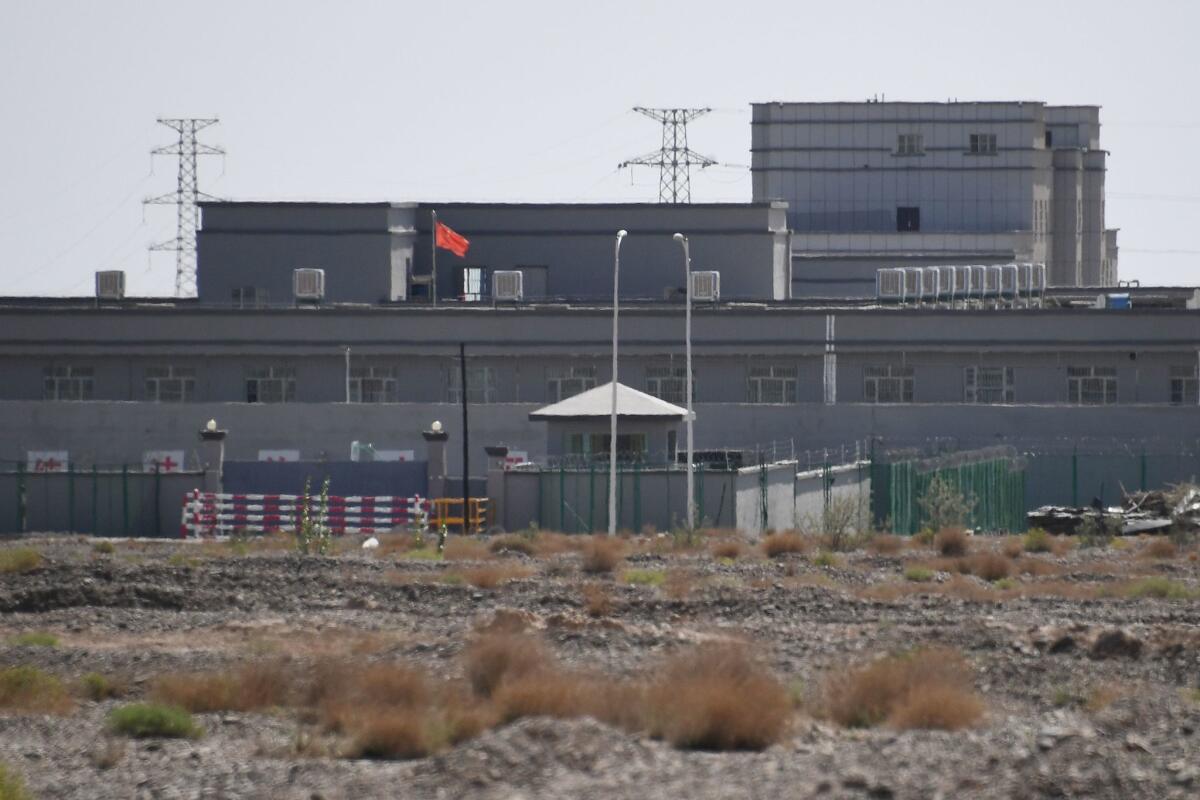Your Apple phone, Adidas shoes and Sony TV may have been made in China by forced Uighur labor

The online ad boasted of freshly trained ethnic minority teenagers as if they were commodities for sale. Factories could book workers online at a “minimum order of 100” people, the ad said, and have them delivered to their doorsteps within 15 days.
The ad was included in a report released this week by the Australian Strategic Policy Institute, or ASPI, which advises the Australian government, alleging that Muslim-minority Uighurs have been sent from “reeducation” camps in China’s Xinjiang province to factories across China, where they are forced to make consumer goods for the world.
The report used government documents, Chinese news media and independent reporting in collaboration with the Washington Post to track transfers of at least 80,000 Uighurs from Xinjiang to Chinese factories that supply 83 global brands including Nike, Apple, Dell, Adidas, BMW, Gap, Huawei, Samsung, Sony and Volkswagen.
“The Xinjiang government has organized around 1,000 Xinjiang trainees who have already passed political and medical examinations,” said an advertisement posted on a Chinese human resources forum and cited in the report.
“They are between 16-18 years old and are managed by Xinjiang government-appointed cadres. Factories can apply for current Xinjiang police to be stationed 24-hours a day for in-factory management!” said the ad, which was posted Nov. 27.
Many Uighurs are coerced into these programs through surveillance, police control, and the threat of detention or family members’ detention, the ASPI report said, contrary to Chinese authorities’ claims that the work programs are voluntary.
It’s the latest step in a campaign of forced assimilation into Han Chinese culture through mass detention, reeducation and labor that Beijing has implemented in Xinjiang since 2017 — one that now reaches global supply chains and U.S. consumers.
China’s Ministry of Foreign Affairs spokesman Lijian Zhao criticized the report, saying it was following “U.S. anti-China forces” to “smear China’s efforts at counterterrorism and de-radicalization in Xinjiang.”
“All participants in de-radicalization training have graduated and found stable jobs with the government’s help. They live happy lives,” Zhao said.
Labor transfers from Xinjiang to inland provinces stretch back more than a decade. Uighur workers were already being sent to coastal factory towns in the early 2000s through programs that drew similar criticism from human rights groups for being coercive.
Such programs slowed after 2009, when clashes between Uighur and Han workers in a Guangdong factory sparked deadly ethnic riots in Urumqi, Xinjiang’s capital.
But the drive to “aid” Xinjiang through forced methods of assimilation ramped up again after President Xi Jinping came into power in 2013. It accelerated after 2016, when Communist Party hard-liner Chen Quanguo, the former party secretary of Tibet, took over as party secretary in Xinjiang.
Chen’s security-focused policies have also included indoctrination of Uighur children in boarding schools while separated from their detained parents, sending Han Chinese “big brothers” and “sisters” to live in Uighur homes, and employment of “reeducated” Uighurs as workers in factories often owned by Han Chinese settlers from inland China.
One Han Chinese factory owner told state media in November 2019 that he’d considered Southeast Asia and the China-North Korea border before deciding to open his new garment factory in Xinjiang, where he could employ large numbers of young Uighurs at low wages.
“North Korean workers are pretty good, but I didn’t want my wages to go abroad,” he said. “In the end, I chose Xinjiang. It conforms with national strategies, and this place needs labor-intensive business to drive employment.”
Eli Friedman, a sociologist who studies labor in China at Cornell University, said the Uighur labor program is the state’s attempt to “kill two birds with one stone: the first bird being so-called counter-extremism, and the second one, the labor shortage problem.”
Chinese manufacturers in low-end, labor-intensive industries have struggled with a shrinking labor force in the last decade. Rising wages, changing social expectations, lower birth rates, and development of inland cities such as Chengdu and Chongqing have all diminished the masses of rural workers who used to fill China’s factories at next-to-nothing costs.
Labor rights had also improved in the early 2000s, when a new labor contract law went into effect, minimum wages were established and civil society sprouted up, notably in southern China, where labor activists and social workers spread awareness for workers’ rights.
“All of that has changed under Xi Jinping,” Friedman said, pointing to arrests of labor organizers, stagnant minimum wages and more laborers working without contracts in the last five years.
“It is not an optimistic time for any workers, or for Uighur and minority workers in particular,” he said.
China has a history of “reeducation through labor.” In the Mao Tse-tung era, people deemed in need of “thought reform” were sent to Soviet-inspired labor camps. But the state usually made them work on infrastructure or agriculture projects, not in private factories for foreign enterprises.
James Leibold, a scholar of China’s ethnic policies at La Trobe University in Australia, compared the labor programs to a decades-old system in which minority students as young as 10 years old have been sent from Xinjiang and Tibet to boarding schools in Han-majority provinces. The intention is “very similar,” Leibold said.
“It’s about disciplining, it’s about instilling Han cultural norms, it’s about increasing capacity with regard to Mandarin language, encouraging inter-ethnic mingling... This has been on the agenda of the party-state for several decades,” he said.
The difference is that such school programs were voluntary and even oversubscribed, as Uighur parents wanted their children to get higher-quality educations in inland schools. The work programs, however, appear to be much more coercive. But Leibold added that the party may be shifting strategy after realizing that mass incarceration camps are a financial and logistical strain.
“We’re entering a kind of reeducation 2.0 phase where the party’s trying to think about how it continues the long-term mission, but does it in a way more sustainable than massive internment,” he said. “It’s extremely costly and labor intensive.”
The ASPI report said some of the companies mentioned in the report had already promised to terminate relationships with the suppliers using forced Uighur labor.
Others, including Adidas, Bosch and Panasonic, told ASPI they had no direct contractual relationships with the suppliers using Uighur labor transfers. But none could rule out links further down their supply chains.
Apple, whose supply chain relies on Chinese labor and has faced criticism for poor worker protections for years, released a statement saying the company is “dedicated to ensuring that everyone in our supply chain is treated with the dignity and respect they deserve. We have not seen this report but we work closely with all our suppliers to ensure our high standards are upheld.”
Rep. Jim McGovern (D-Mass.) wrote on Twitter on Tuesday that he would announce legislation with Sen. Marco Rubio (R-Fla.) next week to prohibit imports from Xinjiang to the U.S.
“Members of Congress stand in solidarity with Uyghurs and other Muslim ethnic groups in China. U.S. and Chinese businesses should not profit or be complicit in forced labor and possible crimes against humanity,” McGovern wrote.
More to Read
Start your day right
Sign up for Essential California for news, features and recommendations from the L.A. Times and beyond in your inbox six days a week.
You may occasionally receive promotional content from the Los Angeles Times.







